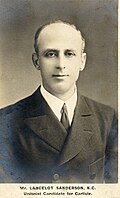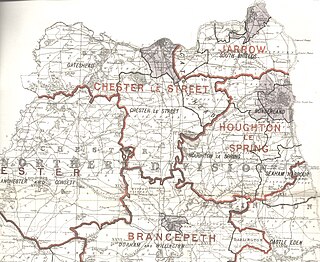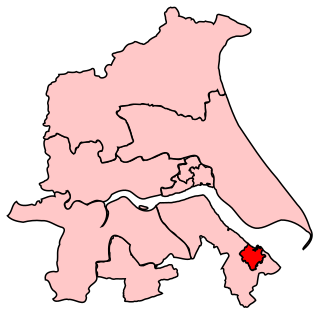| ||||||||||||||||
| ||||||||||||||||
| ||||||||||||||||
The 1905 Carlisle by-election was a Parliamentary by-election held on 14 July 1905. [1] The constituency returned one Member of Parliament (MP) to the House of Commons of the United Kingdom, elected by the first past the post voting system.
| ||||||||||||||||
| ||||||||||||||||
| ||||||||||||||||
The 1905 Carlisle by-election was a Parliamentary by-election held on 14 July 1905. [1] The constituency returned one Member of Parliament (MP) to the House of Commons of the United Kingdom, elected by the first past the post voting system.

The sitting MP, Rt Hon. William Gully resigned due to ill-health [2] and was raised to the peerage with the title of Viscount Selby, of the City of Carlisle. He had been Liberal MP for the seat of Carlisle since the 1886 General Election. Since 1895 he had been Speaker of the House of Commons. The seat had been Liberal since 1868. After Gully became Speaker in 1895, the Conservatives, in accordance with the traditions of the time, chose not to oppose him at the 1900 general election.

The Carlisle Liberal Association selected 53-year-old Frederick Chance as their candidate to defend the seat. Chance was from a long-established family of businessmen and politicians in Carlisle. He ran the family's cotton-manufacturing firm in the town, Ferguson Brothers, [3] and served as Mayor of Carlisle in 1904, before becoming a member of Cumberland County Council. [3] Both his grandfather Joseph Ferguson and his uncle [3] Robert Ferguson had been Members of Parliament (MPs) for the borough of Carlisle and he was a brother-in-law of Sir Henry Seton-Karr, [3] the MP for St Helens.
The Carlisle Conservative Association selected 42-year-old Lancelot Sanderson as their candidate to challenge for the seat. Sanderson was a barrister of the Inner Temple, he was appointed Recorder of Wigan in 1901 [4] and took silk in 1903. [5] He was also a cricketer. [6] He played two first-class matches; the first for Lancashire in 1884, and the second for the Marylebone Cricket Club four years later. [7]

Polling Day was fixed for 14 July 1905. The small Carlisle branch of the Social Democratic Federation chose to play no part in the election and gave no advise to electors. [8] Richard Bell, the General Secretary of the Amalgamated Society of Railway Servants sent a message urging working men not to support the Conservative candidate, stating that a vote for him would be against all labour members and the interests of labour. [9] The constituency included about 700 Irish and Roman Catholic voters, so the issue of Irish Home Rule played a part. Chance, the Liberal candidate, did not fully support party policy of granting home rule to Ireland. As a result, the Irish Parliamentary Party chose not to give him their support and advised the Irish electors in Carlisle to remain neutral. [8] The North of England Temperance League announced that as no candidate supported banning the sale of alcohol, they could not recommend either to the Carlisle electors. [10]
The Liberals held the seat and won the largest majority in the history of the constituency:

| Party | Candidate | Votes | % | ±% | |
|---|---|---|---|---|---|
| Liberal | Frederick Chance | 3,616 | 58.3 | N/A | |
| Conservative | Lancelot Sanderson | 2,586 | 41.7 | New | |
| Majority | 1,030 | 16.6 | N/A | ||
| Turnout | 6,202 | 84.4 | N/A | ||
| Liberal hold | Swing | N/A | |||
Chance was re-elected unopposed in 1906, [12] and held the seat until the January 1910 general election, when he did not stand again. [13] Sanderson was elected as Member of Parliament (MP) for the Appleby division of Westmorland at the January 1910 general election.
Liverpool Exchange was a borough constituency within the city of Liverpool in England, centred on Liverpool Exchange railway station. It returned one Member of Parliament (MP) to the House of Commons of the Parliament of the United Kingdom, elected by the first past the post system.

Paddington North was a borough constituency in the Metropolitan Borough of Paddington in London which returned one Member of Parliament (MP) to the House of Commons of the Parliament of the United Kingdom, elected by the first past the post voting system. It was created in 1885, and abolished for the February 1974 general election.
Brighton was a parliamentary constituency of the House of Commons of the Parliament of the United Kingdom from 1832 until it was divided into single-member seats from the 1950 United Kingdom general election. Covering the seaside towns of Brighton and Hove in East Sussex, it elected two Members of Parliament (MP) by the block vote system of election.
Finsbury East was a parliamentary constituency centred on the Finsbury district of North London, England. It returned one Member of Parliament (MP) to the House of Commons of the Parliament of the United Kingdom, elected by the first past the post system.
Liskeard was a parliamentary borough in Cornwall, which elected two Members of Parliament (MPs) to the House of Commons from 1295 until 1832, and then one member from 1832 until 1885. The constituency was abolished by the Redistribution of Seats Act 1885.
The 1905 Barkston Ash by-election was a Parliamentary by-election held on 13 October 1905. The constituency returned one Member of Parliament (MP) to the House of Commons of the United Kingdom, elected by the first past the post voting system.

Sir Frederick William Chance was a British Liberal Party politician from Carlisle. He sat in the House of Commons from 1905 to 1910.
The 1911 West Ham North by-election was a Parliamentary by-election which was held on 8 July 1911. It returned one Member of Parliament (MP) to the House of Commons of the Parliament of the United Kingdom, elected by the first past the post voting system.
The 1912 Edinburgh East by-election was a Parliamentary by-election held on 2 February 1912. The constituency returned one Member of Parliament (MP) to the House of Commons of the United Kingdom, elected by the first past the post voting system.
The North West Norfolk by-election was a Parliamentary by-election held on 31 May 1912. The constituency returned one Member of Parliament (MP) to the House of Commons of the United Kingdom, elected by the first past the post voting system.

The 1914 North West Durham by-election was a Parliamentary by-election held on 30 January 1914. It returned one Member of Parliament (MP) to the House of Commons of the United Kingdom, elected by the first past the post voting system.

The 1914 Great Grimsby by-election was a Parliamentary by-election held on 12 May 1914. The constituency returned one Member of Parliament (MP) to the House of Commons of the United Kingdom, elected by the first past the post voting system. It was one of the last by-election contests to take place before the outbreak of the Great War, and provided a good indicator of how the main parties would have performed at an anticipated general election for 1914 or 1915.
The 1909 Glasgow Central by-election was a Parliamentary by-election held on 2 March 1909. The constituency returned one Member of Parliament (MP) to the House of Commons of the United Kingdom, elected by the first past the post voting system.
The North Dorset by-election was a Parliamentary by-election held on 26 January 1905. The constituency returned one Member of Parliament (MP) to the House of Commons of the United Kingdom, elected by the first past the post voting system.
The 1905 New Forest by-election was a Parliamentary by-election held on 6 December 1905. The constituency returned one Member of Parliament (MP) to the House of Commons of the United Kingdom, elected by the first past the post voting system.
The North West Staffordshire by-election was a Parliamentary by-election held on 31 July 1907. The constituency returned one Member of Parliament (MP) to the House of Commons of the United Kingdom, elected by the first past the post voting system.

The Mile End by-election was a Parliamentary by-election held on 12 January 1905. The constituency returned one Member of Parliament (MP) to the House of Commons of the United Kingdom, elected by the first past the post voting system.

The Hampstead by-election was a Parliamentary by-election held on 26 October 1905. The constituency returned one Member of Parliament (MP) to the House of Commons of the United Kingdom, elected by the first past the post voting system.
The 1905 Elgin Burghs by-election was a Parliamentary by-election held on 8 September 1905. The constituency returned one Member of Parliament (MP) to the House of Commons of the United Kingdom, elected by the first past the post voting system.
The Appleby by-election was a Parliamentary by-election held on 2 March 1905. The constituency returned one Member of Parliament (MP) to the House of Commons of the United Kingdom, elected by the first past the post voting system.